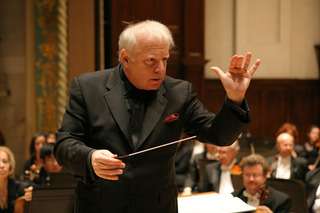|
Back
Mighty William Schuman New York
Avery Fisher Hall, Lincoln Center
04/01/2010 -
William Schuman: Circus Overture (Side show for Orchestra) – Violin Concerto (1959 version) – Andantino from Violin Concerto (1950 version) – Symphony No. 3
Francisco Ladron de Guevara-Finck (Violin)
Juilliard Orchestra, Leonard Slatkin (Conductor)

L. Slatkin (© Detroit Symphony Orchestra)
What could possibly account for the relative paucity of music by William Schuman in the past decade? As Leonard Slatkin showed last night, with a ravishing Juilliard Orchestra, Mr. Schuman was not simply “one of the bunch”, a member of the powerful cabal of composers who ruled American music in the 1950’s. If he didn’t compose an Adagio for Strings or popular Martha Graham ballets, Mr. Schuman was–is–a composer of stunning, surprising and multifaceted music.
It is so easy to say that William Schuman could have been a Roy Harris clone. Though one was an Okie, and the other a Noo Yawker, Schuman studied with Harris and wrote some music (like last night’s Third Symphony), which possessed the openness, the optimism and color which formed American music at that time.
That work is still Schuman’s most popular. But it was the Violin Concerto last night which showed an entirely different composer, a Schuman who was razor-dangerous, difficult, with a white-knuckle nervous energy.
Two years ago, Gil Shaham played the work brilliantly, but he accentuated the jazzy undertone, playing the cadenza with unerring ease. None of that was true with the young Mexican violinist Francisco Ladron de Guevara-Finck, who, from the beginning, showed how damned difficult the piece was. No, he didn’t mean to make it a chore, not by any means. But his violin, without the dulcet tones of Mr. Shaham became an instrument of wicked gestures, with counterpoint in the first movement cadenza that was almost violent.
When Mr. Shaham played it, I wrote that it really should become part of the repertoire, but he made it sound simple. Mr. Ladron de Guevara-Finck saw that this was a singular piece of American music. Yes, Schuman, a master of melody, provided some contrasts (mainly an ethereal English horn solo by Julia deRosa), and some funny oom-pah music, as well as passages of mnemonic bird music to accompany the violin. But Mr. Ladron de Guevara-Finck made it his acerbic contribution to great American music.
During those few moments when the orchestra played alone, Mr. Ladron de Guevara-Finck shook his head in rhythm, and one was thankful that he was only a human fiddle-player, not the Fiddler from Hell.
The piece had been revised several times, and for curiosity sake, Mr. Slatkin had Mr. Ladron de Guevara-Finck play the original slow movement after the intermission. The melody was mundane, and one must be thankful that Mr. Schuman revised it into two large movements.
The opening work was Music for a Sideshow, commissioned by the Serge Diaghilev of the Bronx, Billy Rose. Rose turned Carmen into Carmen Jones, urged Stravinsky to write a piece for elephants and got William Schuman to write another circus piece. The composer responded with a work trembling with drums, trumpets, a mawkish waltz and other dances, all in good fun.
The Third Symphony was introduced by Mr. Slatkin, who had a long friendship with the composer and is perhaps his greatest exponent. Mr. Schuman used four 18th Century forms–passacaglia, fugue, chorale and toccata–but the style was far too virile, the energy too palpable for an Classical Era.
This also showed how the Juilliard Orchestra could no more be called a “student ensemble” than William Schuman could have been called a “school administrator”. The fanfares echoing from each choir in the opening tested each division for expertise. The final toccata gave each soloist such blazingly fast passages that one was simply dazzled by the playing.
Dazzled and happy indeed that Mr. Slatkin played all the Schuman works with conviction, color and, above all, exhilaration.
Harry Rolnick
|